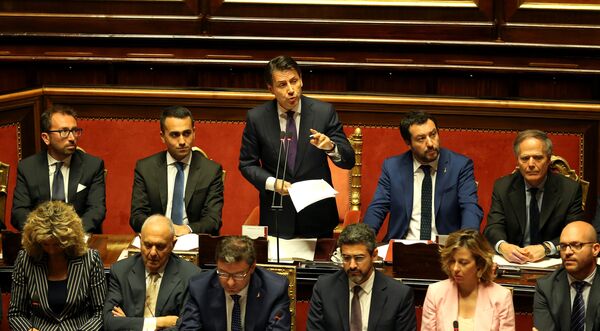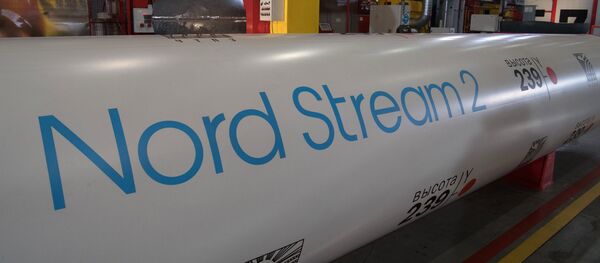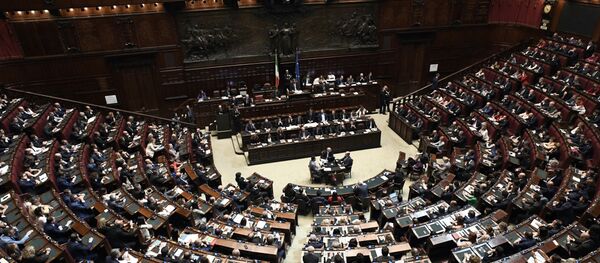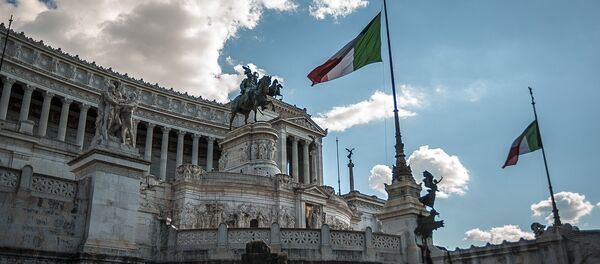Washington is increasing pressure on EU member states, threatening to slap sanctions on entities involved in the Russian-led Nord Stream 2 project under the Countering America's Adversaries Through Sanctions Act (CAATSA).
Speaking to Sputnik, Daniele Pozzati, an Italian journalist and political observer, shared his views on the apparent struggle within the European bloc.
Could Nord Stream 2 Sanctions Trigger EU-US Divorce?
It appears that US attempts to bring Nord Stream 2 to a halt may become a game-changer given that Germany, regarded by many as a major beneficiary of the endeavor, is at the same time a driving force behind each EU decision to extend sanctions against Russia.
However, according to the journalist, Washington's potential sanctions against Nord Stream 2 are unlikely to translate into an EU-US divorce or the bloc's shift to Russia even if they hit some European businesses.
"No, for two reasons," Pozzati says. "First, there is no such a thing as an EU policy that might shift and drift away from the US and towards Russia. Not as long as all EU countries are dependent on NATO for their defense. What we might see — and we are already seeing — is a discussion on the need for a European army. In the short term, the US needs not to worry: it will be all talk and little else."
"Take the volume of Germany-Russia bilateral trade: having almost halved in 2015, it began to recover already in 2016. And by 2017 it had peaked by 23 percent. Prospects for 2018 look just as rosy. Nord Stream 2 really is just the icing on the cake," he opined.
Meanwhile, Washington has reportedly forced Denmark into postponing its permission for the construction of the Nord Stream 2 gas pipeline through Danish territorial waters. Copenhagen remains the only capital that has yet to give the "green light" to the endeavor. Earlier, Germany, Finland and Sweden issued their permissions to Nord Stream 2 AG, the pipeline's operator.
As tensions continue to simmer around the Russian-European gas pipeline, Russian Energy Minister Alexander Novak met with US Treasury Secretary Steven Mnuchin and Energy Secretary Rick Perry on June 26. According to Novak, the sides discussed Russia's Nord Stream 2 undersea gas pipeline among other issues.

Will Italian Government 'Veto' EU's Anti-Russian Sanctions?
On the other hand, the EU is due to consider the extension of the bloc's own sanctions, targeting specific sectors of the Russian economy.
"The EU's lack of transparency is appalling," the Italian observer noted. "Not only is it behind closed doors as usual, with the entire decision-making process thoroughly removed from public view. We do not even know when a decision will take place. The European Council's website contains no information about it. Only the chronology of past decisions. So far, sanctions have been extended each time by six months, at least a month before expiry date. The current Russia sanctions expire on July 31, 2018."
On June 25, Italian Deputy Prime Minister and leader of the Eurosceptic Lega Party Matteo Salvini dropped the hint that the new Italian government is ready to put words about lifting the EU's sanctions on Russia into action while speaking to Russia's Rossiya 24 TV channel.
Theoretically, Rome is capable of upsetting Brussels' applecart, Pozzati believes: "The decision to extend sanctions requires, like many EU decisions, a unanimous voting. Thus, any negative vote turns into a de-facto veto towards all other member-states."
The observer explained that such a step is fraught with certain political risks, especially amid growing pressure from NATO, Brussels and Washington.
"Italy will have to break precisely this inertia," he suggested. "Not an easy task for a new government. Then there are pressures from NATO, and those coming directly from Washington."
Meanwhile, Italian Prime Minister Guiseppe Conte signaled on June 27 that the extension of EU sanctions against Russia "should not be automatic," adding that Brussels is due to consider the issue on June 28-29. According to Pozzati, this is a truly meaningful development.
He envisions that the decision might take place on June 29 at the earliest, or the beginning of next week.
Although France and Germany have seemingly reconciled themselves with the sanctions regime and even benefitted from the political clout, "the same cannot be said for other European businesses, especially small ones," Pozzati pointed out.
"Italian farmers, and whole countries like Greece and Bulgaria, have suffered greatly under the EU sanctions and the resulting Russian embargo," he said. "They received no compensation from Brussels. Most, in this increasingly unequal EU, do not benefit from the same political clout and are losing Russia as a major export market."
The views and opinions expressed by Daniele Pozzati and Ekaterina Blinova are those of the contributors and do not necessarily reflect those of Sputnik.





